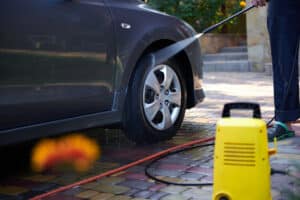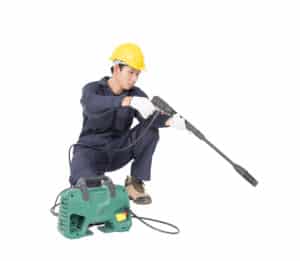What is the Difference Between Electric and Gas-Powered Pressure Washers?
Key Takeaways
- Gas pressure washers have higher psi and GPM ratings compared to electric models, making them more suitable for heavy-duty cleaning tasks
- Electric pressure washers are easier to use, lighter, and more compact compared to gas-powered ones
- Electric pressure washers have a lower environmental impact, produce no emissions, and tend to be quieter during operation
Pressure washers are a versatile tool for cleaning various surfaces, from driveways and decks to outdoor furniture and vehicles. When choosing a pressure washer, one important decision to make is whether to opt for an electric or gas-powered model. Both types have their own advantages and considerations, which we will explore in this article. Let’s dive into the key differences between electric and gas pressure washers.
Power
One of the primary differences between electric and gas pressure washers is their power output. Gas pressure washers typically have higher psi (pounds per square inch) and GPM (gallons per minute) ratings compared to electric models. Gas pressure washers can range from 2,500 to over 4,000 psi and have a flow rate between 2.5 to 4.0 GPM, making them more suitable for heavy-duty cleaning tasks. On the other hand, electric pressure washers produce about 1,500 to 3,000 psi and 1.5 to 2.5 GPM, which is generally sufficient for light to medium-duty cleaning.
Ease of Use
Electric pressure washers are often considered easier to use, especially for beginners. They have a lower power output, making them more manageable and less likely to damage delicate surfaces. Electric models are typically lighter and more compact, making them easier to maneuver and transport. Additionally, electric pressure washers are easier to start compared to gas-powered ones, which often require a pull-start mechanism.
Environmental Impact
When it comes to environmental impact, electric pressure washers have the upper hand. They draw electricity from the home power supply and produce no emissions during operation. This makes them a cleaner and more eco-friendly choice compared to gas pressure washers, which burn gasoline and release harmful emissions into the atmosphere. Electric pressure washers also tend to be quieter during operation, making them more suitable for use in residential areas or enclosed spaces.
Maintenance
In terms of maintenance, electric pressure washers generally require less upkeep compared to gas-powered models. Electric pressure washers typically only require regular cleaning and semi-regular lubrication. On the other hand, gas pressure washers have combustion engines that require additional maintenance tasks. These tasks may include changing the oil and gas filters, topping up fluids, and replacing spark plugs. Regular maintenance is crucial to ensure optimal performance and longevity for gas pressure washers.
Durability
Gas pressure washers are generally considered more durable and resilient compared to electric models. They are designed to withstand heavy-duty use and can handle more challenging cleaning tasks. Electric pressure washers, while still capable of tackling many cleaning jobs, may be less durable and have a shorter lifespan. However, with proper care and maintenance, both types can provide reliable performance for several years.
Performance
When it comes to performance, gas pressure washers offer superior cleaning power due to their higher psi and GPM ratings. This makes them well-suited for heavy-duty cleaning tasks such as removing deep-seated stains or cleaning large outdoor areas. Electric pressure washers, while less powerful, are still effective for light to medium-duty cleaning, such as washing cars, patios, or smaller surfaces.
Cost
Cost is often a significant factor when choosing between electric and gas pressure washers. Electric pressure washers are generally more affordable compared to their gas counterparts. The price range for electric models typically falls between $100 and $400, depending on the features and specifications. Gas pressure washers, on the other hand, tend to be more expensive, with average prices ranging from $300 to $600 or more.
Lifespan
In terms of lifespan, gas pressure washers generally have a longer operational life compared to electric models. With proper maintenance, gas pressure washers can last between five to seven years. On the other hand, electric pressure washers typically have a lifespan of about three to five years. It’s worth noting that individual usage patterns and maintenance practices can impact the actual lifespan of both types of pressure washers.
Safety
Both electric and gas pressure washers have safety considerations. Gas pressure washers, with their higher power output, may pose a higher risk of injury if not handled properly. It’s essential to follow safety precautions and guidelines when operating any pressure washer, regardless of the power source. This includes wearing protective gear, using the appropriate nozzles and accessories, and avoiding direct contact with the spray.
Conclusion
Choosing between an electric or gas-powered pressure washer ultimately depends on your specific needs and preferences. Gas pressure washers offer more power and durability, making them ideal for heavy-duty cleaning tasks. However, they require more maintenance and can be louder and emit more emissions. Electric pressure washers are easier to use, more environmentally friendly, and generally more affordable. They are suitable for light to medium-duty cleaning and offer convenience with their quieter operation and ease of maintenance. Consider your cleaning requirements, budget, and the trade-offs between power and convenience when making your decision.
Related Websites:
FAQs:
Q: What are the benefits of using pressure washers?
Pressure washers offer various benefits for cleaning tasks. They can effectively remove dirt, grime, and stains from surfaces, saving you time and effort. Additionally, pressure washers can reach areas that are difficult to clean with traditional methods, providing a thorough and deep cleaning.
Q: What are the advantages of electric pressure washers?
Electric pressure washers have several advantages. They are easy to use and portable, allowing you to move them around conveniently. They also operate quieter compared to gas-powered models, creating a more comfortable working environment. Additionally, electric pressure washers are environmentally friendly as they produce no emissions.
Q: What are the advantages of gas-powered pressure washers?
Gas-powered pressure washers have high power and water flow rate, making them suitable for heavy-duty and larger cleaning tasks. They offer increased mobility as they do not require power outlets, allowing you to use them in remote locations. Gas-powered pressure washers are ideal for jobs that demand maximum power and versatility.
Q: What are the main differences between electric and gas-powered pressure washers?
The main differences between electric and gas-powered pressure washers include power and water flow rate, mobility and portability, noise levels, environmental impact, and maintenance requirements. Electric pressure washers have less power and mobility but are quieter and more environmentally friendly. On the other hand, gas-powered pressure washers offer greater power and mobility but are louder and have emissions.






